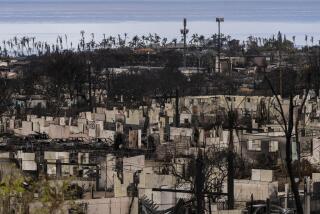Fines Urged for Negligent Phone Outages : Telecommunications: A new bill would also require companies to make refunds to consumers.
WASHINGTON — Backed by members of the Federal Communications Commission, a House leader introduced legislation Tuesday that would force telephone companies to pay fines and make refunds to consumers for major phone outages caused by negligence.
The bill by Rep. Edward J. Markey (D-Mass.), chairman of the House Energy and Commerce telecommunications and finance subcommittee, also proposed other steps to improve the reliability of the nation’s phone system in response to massive breakdowns over the last three years.
FCC Chairman Alfred C. Sikes, appearing with the other four commissioners at a hearing by the subcommittee, said that Markey’s proposed penalties are “quite appropriate for consideration.”
Commissioners Sherrie P. Marshall and Ervin S. Duggan voiced even stronger support, while Andrew C. Barrett expressed some concerns and James H. Quello did not comment.
In offering his bill, Markey cited significant phone failures in Los Angeles, Washington and New England last year and in New York in both 1990 and 1991, that disrupted business, emergency, air traffic control and personal lines for three to seven hours.
In most cases, a malfunctioning computer switching program was the culprit. But in one instance, an AT&T; crew accidentally damaged a fiber-optic telephone cable.
“Today’s telephone technology is very much a double-edge sword,” Markey said. “The cutting edge promises dramatic increases in network capacity, capability and survivability. But the trailing edge introduces greater vulnerability to consequences of massive proportion and severity.”
Under Markey’s bill, consumers hit by a phone outage would receive refunds scaled to the severity of the breakdown. If the disruption lasted from one to six hours on at least 25,000 lines, consumers would be refunded one-fourth of their phone bill for the previous month. They would get back half the bill for a six- to 12-hour outage and the entire amount for any failure of more than 12 hours.
Companies would face possible fines of $10,000 to $20,000 per minute of disrupted service, depending on the degree of negligence. But companies also could have the penalties substantially reduced by the FCC if they took action to prevent recurrences.
Markey’s bill is also aimed at requiring the FCC to take a more active role in developing safeguards for increasingly sophisticated telephone networks.
But Sikes, who advocates less regulation than does Markey, suggested that substantial responsibility for improvement be placed on a newly created Network Reliability Council, which includes phone companies, unions, consumer groups and state officials.
“We are looking to the council for recommendations for possible FCC actions,” Sikes said. “There is a mixed responsibility here, public and private.”
“The problem I have with your approach,” Markey responded, “is that when everybody’s responsible, nobody’s responsible.”
Duggan agreed, saying in a prepared statement to the panel that the FCC needs to take more steps on its own. He said the commission should:
* Press for more backup systems.
* Develop alternatives to 911 emergency lines when phones go dead.
* Create a special FCC unit to investigate outages promptly.
“In this serious moment, the wolf at our door is not overzealous regulation,” Duggan said. “The real wolf . . . is the vulnerability of our telecommunications infrastructure, made starkly clear by the events of last year.”






